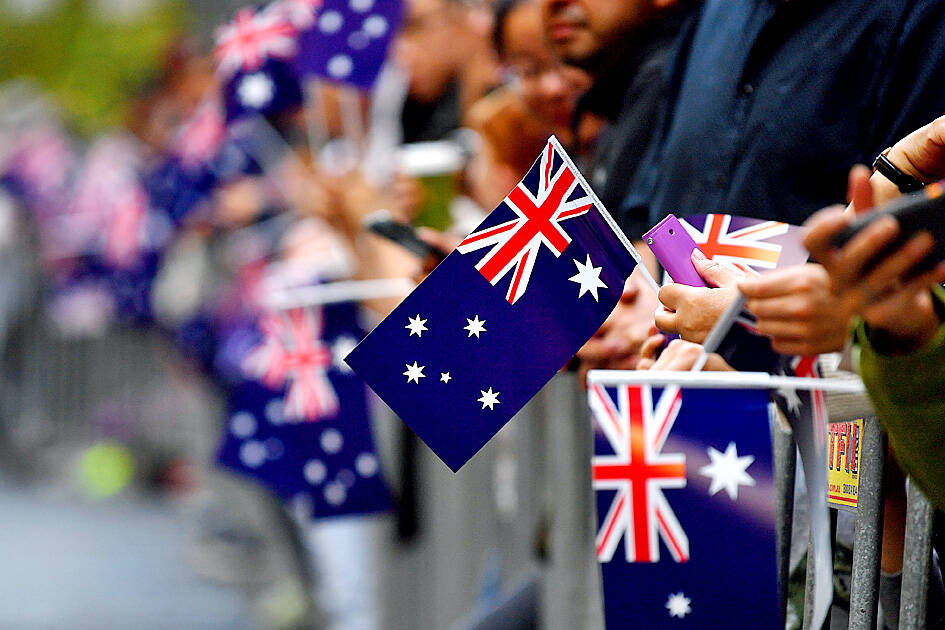The Australian government has appointed a director of strategic affairs to its representative office in Taiwan in response to increased Chinese threats in the Indo-Pacific region, the Ministry of Foreign Affairs said.
The Australian Office in Taipei created the post last year amid Chinese expansionism, the ministry said, adding that the director has been in close contact with the Ministry of National Defense and other agencies.
The Taipei Economic and Cultural Office in Australia has also maintained close communications with the Australian Department of Foreign Affairs and Trade on the regional security situation, it said.

Photo: EPA-EFE
The ministry’s announcement came after Minister of Foreign Affairs Joseph Wu (吳釗燮) called on Canberra to send military attaches to Taipei in an interview with The Australian, which was published online on Sunday and in print yesterday.
The representative offices of the US, Japan and Singapore all have military attaches, Wu said.
Military attaches allow the two sides to maintain systematic and institutionalized engagement, share intelligence and jointly assess the regional situation, Wu told The Australian.
Regional issues call for careful discussions between Taiwan and Australia, he said, adding that Taiwan would respect Canberra’s decision.
The Australian Office in Taipei has been communicating with Taiwanese national security officials, which shows that Australia values Taiwan’s opinions, Wu said.
Canberra has always attached importance to peace and stability in the Indo-Pacific region, opposed unilateral changes to the “status quo” and supported Taiwan’s international participation, he said.
Wu thanked the Australian office for issuing a joint statement with seven other representative offices in Taiwan to support Taipei’s participation in the WHO and the World Health Assembly last month.
Australia reiterated the importance of cross-strait peace and stability during the G7 leaders’ summit in the same month and called for the peaceful resolution of cross-strait issues, he said.
Taiwan agrees that a cross-strait conflict “is neither imminent nor inevitable” as US Secretary of Defense Lloyd Austin said at the Shangri-La Dialogue earlier this month, Wu said.
Taiwan would continue to work with democratic partners to deter China by bolstering its self-defense capabilities, he said.
Wu said he hopes that Taiwan and Australia can enhance substantive cooperation, citing the example of Sydney-based Macquarie Capital investing in the Formosa II wind farm in Taiwan, which shows that the two sides are working toward the common goal of achieving net zero emissions by 2050.
The cooperation also shows that Taiwan is safe and stable even in the face of Chinese intimidation, and that Australian investment in Taiwan is increasing instead of decreasing, he said.
Wu called on Australia to begin negotiations for an economic cooperation agreement with Taiwan following the success of such an agreement with New Zealand and the recent signing of the initial agreement under the US-Taiwan Initiative on 21st-Century Trade.
Additional reporting by CNA

Taiwanese can file complaints with the Tourism Administration to report travel agencies if their activities caused termination of a person’s citizenship, Mainland Affairs Council Minister Chiu Chui-cheng (邱垂正) said yesterday, after a podcaster highlighted a case in which a person’s citizenship was canceled for receiving a single-use Chinese passport to enter Russia. The council is aware of incidents in which people who signed up through Chinese travel agencies for tours of Russia were told they could obtain Russian visas and fast-track border clearance, Chiu told reporters on the sidelines of an event in Taipei. However, the travel agencies actually applied

Japanese footwear brand Onitsuka Tiger today issued a public apology and said it has suspended an employee amid allegations that the staff member discriminated against a Vietnamese customer at its Taipei 101 store. Posting on the social media platform Threads yesterday, a user said that an employee at the store said that “those shoes are very expensive” when her friend, who is a migrant worker from Vietnam, asked for assistance. The employee then ignored her until she asked again, to which she replied: "We don't have a size 37." The post had amassed nearly 26,000 likes and 916 comments as of this

New measures aimed at making Taiwan more attractive to foreign professionals came into effect this month, the National Development Council said yesterday. Among the changes, international students at Taiwanese universities would be able to work in Taiwan without a work permit in the two years after they graduate, explainer materials provided by the council said. In addition, foreign nationals who graduated from one of the world’s top 200 universities within the past five years can also apply for a two-year open work permit. Previously, those graduates would have needed to apply for a work permit using point-based criteria or have a Taiwanese company

The Shilin District Prosecutors’ Office yesterday indicted two Taiwanese and issued a wanted notice for Pete Liu (劉作虎), founder of Shenzhen-based smartphone manufacturer OnePlus Technology Co (萬普拉斯科技), for allegedly contravening the Act Governing Relations Between the People of the Taiwan Area and the Mainland Area (臺灣地區與大陸地區人民關係條例) by poaching 70 engineers in Taiwan. Liu allegedly traveled to Taiwan at the end of 2014 and met with a Taiwanese man surnamed Lin (林) to discuss establishing a mobile software research and development (R&D) team in Taiwan, prosecutors said. Without approval from the government, Lin, following Liu’s instructions, recruited more than 70 software